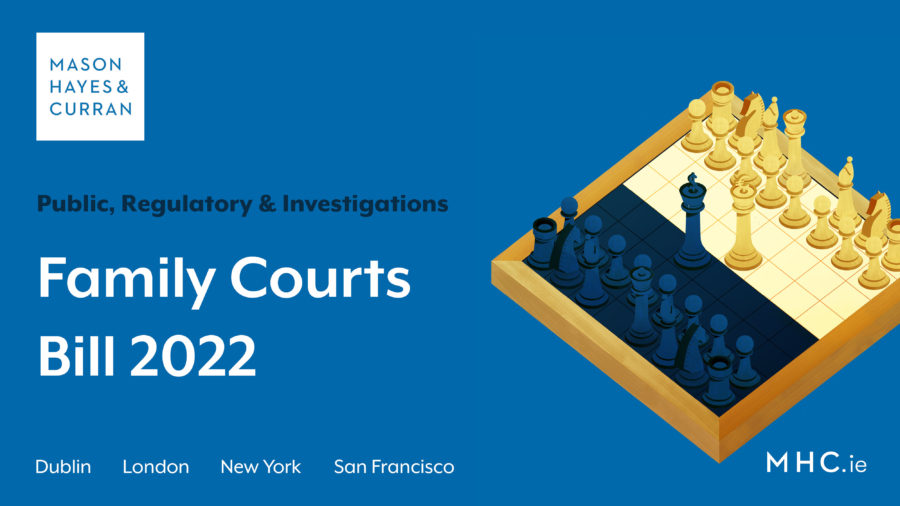
The purpose of the Family Court’s Bill 2022 (the Bill) is to provide for a more efficient and user-friendly family court system for a range of family law proceedings. This will include proceedings under the Adoption Act 2010, as amended. The Bill has recently completed Seanad Éireann, First Stage. The Bill was committed to by the Programme for Government and Justice Plan 2022 and can be viewed here. We take a closer look at some of the main reforms.
As Minister for Justice, Helen McEntee said, the Bill “forms an intrinsic part of the reform of the family justice system and will provide many of the building blocks essential to these reforms”. The Bill will be supported by the construction of a purpose-built Family Law Court complex at Hammond Lane in Dublin.
The main changes being introduced include:
- Introducing a Family High Court, a Family Circuit Court and a Family District Court, each dealing with family law matters as appropriate to its jurisdiction.
- The Bill makes specific provision for proceedings under the Adoption Act 2010, as amended not to be heard in public.
- Judges will be assigned on a full-time basis to the Family Court divisions. These will be judges who, by reason of their training or experience, are suitable to deal with matters of family law. Ongoing professional training in family law will be required.
- It is proposed that new positions of Principal Judge of the Family High Court, Family Circuit Court and Judge of the Family District Court will be created to ensure proper and effective management of these Courts.
- The Bill provides for the establishment of a dedicated Family Law Rules Committee, or alternatively, Family Law Sub-Committees of the general Courts Rules Committees. The aim is to ensure that the rules of court in relation to family law proceedings are coherent and applied with consistency across all levels of the family courts.
- Proceedings will be held in a different building or room from which other court sittings are held or on different days or at different times from other court sittings.
Under the Bill, the courts, legal practitioners and parties to family law proceedings will be required to have regard to certain principles. The key principles include:
- The best interests of every child involved or likely to be affected by the outcome of family law proceedings shall be a primary consideration in the conduct of the proceedings.
- The child’s views should be ascertained, where practicable, and given due weight, having regard to the child’s age and maturity.
- The promotion and engagement by the court in active case management practices.
- The court should encourage and facilitate, as far as possible, alternative dispute resolution, such as mediation - except in cases where this would not be appropriate, such as domestic violence cases.
The aim is that the legislation will enable a greater proportion of non-contentious family law matters to be dealt with at District Court level, thus minimising the costs for litigants.
Conclusion
The publication of the Bill marks an important milestone in efforts to reform the Irish Family Courts system. As James Brown, Minister of State for Law Reform has said, “the Family Court Bill and the Family Justice Strategy will together modernise our family justice system. It is very welcome that the strategy and the Bill recognise the importance of putting children at the centre of family justice in matters which affect them, and adequately hearing their voice in the family justice system”.
It will be important for all stakeholders to ensure that they are familiar with the provisions of the Bill, once enacted, as this will facilitate the smooth running of family and adoption related hearings.
For more information on the implications of the proposed legislation, contact a member of our Public, Regulatory & Investigations team.
The content of this article is provided for information purposes only and does not constitute legal or other advice.







